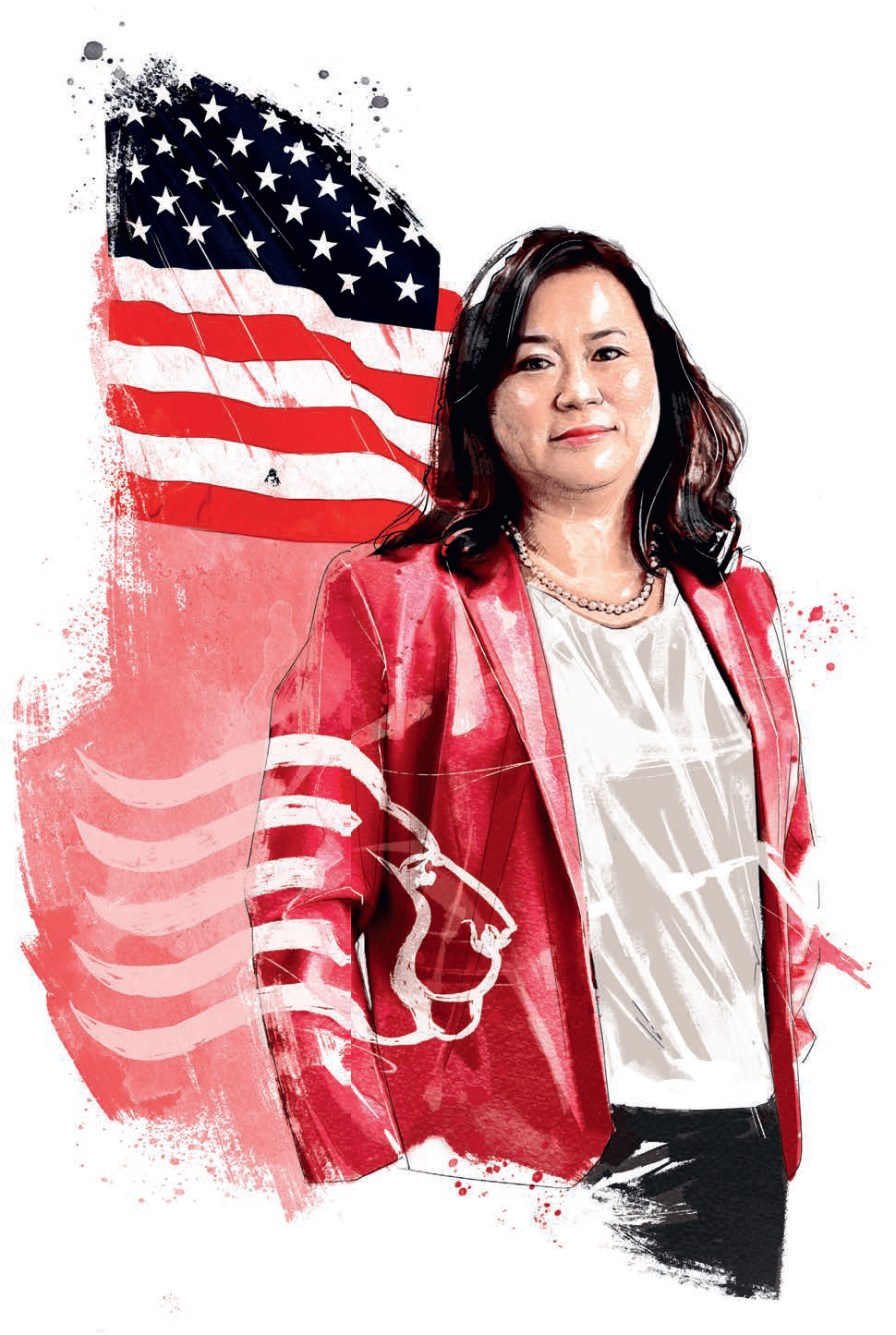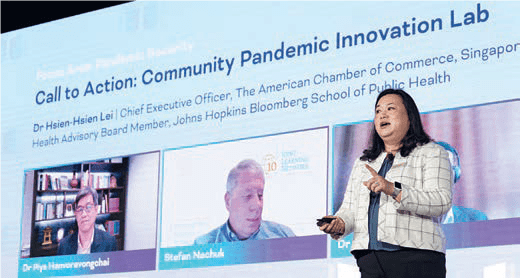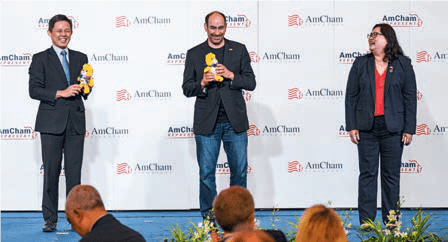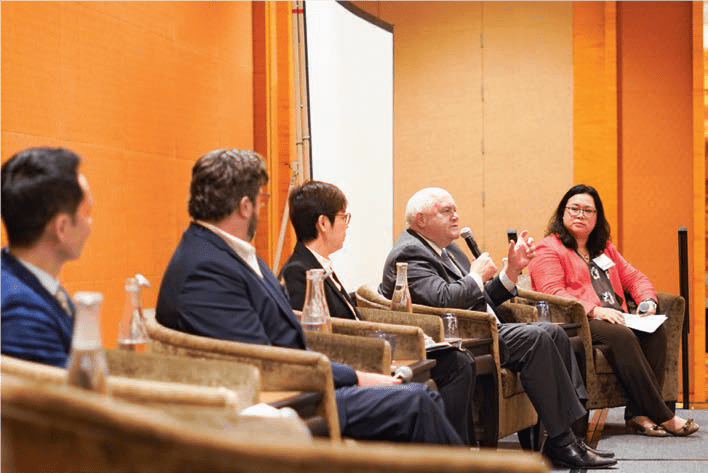Stories > Cheerleader For Diversity
Cheerleader For Diversity
The American Chamber of Commerce CEO shares how Singapore makes her job all too easy, and offers an environment to forge deeper relationships with the wider region.
BY SHWETA PARIDA
ILLUSTRATION KEN LEE
r Hsien-Hsien Lei describes herself as Singapore’s biggest cheerleader. As the Chief Executive Officer of the local chapter of the American Chamber of Commerce (AmCham), she helps to connect the US and Singapore through trade and commerce.
However, alongside business, the epidemiologist who trained at the prestigious Stanford and Johns Hopkins University also deftly straddles the realms of healthcare and policy. Born in Taiwan and raised in the US, Dr Lei, whose father was a nuclear power plant engineer and mother an architect, says that she had a quintessential Asian- American upbringing that focused heavily on education, and traversed the country from Michigan to Washington to California and, finally, Maryland.
“Being a PhD candidate at Johns Hopkins University and being closer to Washington, DC, I started to form my beliefs around the trifecta of business, policy and healthcare,” she says.
After a stint in Taiwan, Dr Lei, 50, moved to Singapore with her Singaporean husband, whom she met while studying for her PhD. “Even though I strongly identify as an American, home is here not just because my husband is Singaporean but also how it has shaped my professional career,” she says.

“Despite its small market size, Singapore’s potential lies in its reputation as a living lab for piloting solutions and developing thought leadership.”
POLICY AND PUBLIC HEALTH
In her own words, her initiation into the world of science started off as a typical Asian kid in the US wanting to be a doctor. “I always clicked with being a doctor - not the physician type but research in genetics and genomics. Even back in school, I worked on projects such as genetic risk factors for type-2 diabetes and end-stage renal disease.”
However, not wanting to be confined to a lab-based role, Dr Lei started to ponder on the role of public policy, and how it impacts the health infrastructure and its reach to people. “Being a physician, you treat patients one at a time, which is important, but in science school, you become aware of so many ways the sciences can benefit mankind,” she says. Armed with stellar academic credentials and a deep interest in policymaking, Dr Lei’s entry into AmCham was a series of fortuitous events that saw her in various roles as a writer and editor for science publications. “I learnt that I could bring value to the communications sector that involved science writing and publishing,” she shares.
Soon, she was recruited by global communications firm Ogilvy to head its healthcare communications department, a role which brought her into contact with AmCham. Having been a co-chair on its Healthcare Committee, Dr Lei found herself diving deeper into the organisation’s role in Singapore. “I wanted to help people understand how vibrant AmCham is,” she says.
But how do the worlds of science and business collide? “To implement healthcare policies at population level, you start thinking about how you influence politicians, policymakers and government agencies in the way they formulate policies,” she says, underlining the collective role these players bring to the table. “The business aspect comes in because economics drive the policies. At AmCham, all three pieces come together. The science aspect probably has never been articulated before. We do advocacy and create business intelligence and insights. But most of AmCham’s members have some science association – from pharmaceuticals to data science, AI and agri-tech.”
THE PANDEMIC-ERA TRUST TEST
Having taken over as AmCham’s CEO in January 2020 – a prescient appointment by the chamber – just before the pandemic began, Dr Lei says that she witnessed a palpable decrease worldwide in people’s trust in experts and scientists.
“There was clearly a trust deficit because people could not comprehend why they were told not to wear a mask at one point followed by mandatory mask wearing,” she explains. “In Singapore, it's different. If the government tells you to do something, you can be confident that the authorities have enough data to back up the rules. On the other hand, in the US, such decisions are driven purely by emotion rather than scientific facts.”
Singapore’s political milieu and governance style are also something that resonate with Dr Lei’s own approach to healthcare and business. She points out that some people often label Singapore’s politicians as “technocrats”, an appellation that suggests that the leaders make decisions based on data. “I find nothing wrong in being governed by efficient technocrats,” she posits. “To me, it means that they are making logical, considerate and thoughtful decisions, and that is why Singapore managed to handle the pandemic so well.”
She admits that while aspects such as communication can be further improved upon, she feels reassured – as a scientist – by the measures being put in place to deal with challenges.

Dr Lei's multifaceted experience in the fields of healthcare, business and public policy has helped her steer AmCham through the turbulence of the Covid-19 pandemic.
GROWING AS A LEADER
US companies as members, Dr Lei acknowledges the wide-reaching role of Singapore as a regional business hub, she says. “You are physically in Singapore but you are so close to other countries,” she observes. “As a scientist, you can gather different examples, data and learn from the differences. It has helped me as a leader by exposing me to different regional perspectives.”
Crediting the efficient governance and policies, the epidemiologist who continues to be in the public health sphere through her academic practice as faculty member at the National University of Singapore’s Saw Swee Hock School of Public Health, says that Singapore makes her job as a leader a tad too easy. “I cannot complain about the fact that we have such easy access to key decision-makers and ministers that we have to find ways to push ourselves more. Our Balestier Conversations series with Singapore Government ministers and business leaders highlights how pivotal Singapore has been to the growth of American MNCs and SMEs in the region, as well as how these businesses have been able to contribute to the Lion City.

Singapore Minister of Education Chan Chun Sing; US Ambassador to Singapore Jonathan Kaplan; and Dr Hsien-Hsien Lei at AmCham's Balestier Conversations series that features dialogues with thought leaders and key decision-makers.
“In Singapore, I do not face the same challenges as my peers who lead AmCham in other countries where governments operate in a different way, and where policies and regulations are not so clear or change frequently.”
Undoubtedly, there has been a huge American influence on Singapore society by way of food and popular culture, she believes, and it is a bond she wants to deepen through not just economic activities but corporate social responsibility initiatives, and socio-cultural programmes. “The US investment in Singapore is nearly US$300 billion, far exceeding any other country in the world. People, including Americans, either do not know or realise that. We have a lot of work to do to go beyond the business pursuits,” she says.
Sharing the findings of AmCham’s recent Asean Business survey, Dr Lei says that Singapore is clearly seen as a conduit to the region – the factors being the ease of doing business and transparency. “Some companies may not have officially declared that Singapore is their regional headquarters, but if you see the number of senior leaders in the country, the centre of gravity is in favour of Singapore,” she notes. “Despite its small market size, Singapore’s potential lies in its reputation as a living lab for piloting solutions and developing thought leadership.”

AmCham provides business insights and connections in Singapore and the region, through events such as the Singapore Dialogue organised by SIF partner, US-Asia Institute, in Singapore in September 2022.
EMBRACING DIVERSITY
A skilled talent pool is another important aspect that Dr Lei attributes to Singapore’s success. She often gets asked why, unlike Americans, who embrace failure that can lead to success later, Singaporeans are risk-averse.
“You are physically in Singapore but you are so close to other countries. As a scientist, you can gather different examples, data and learn from the differences. It has helped me as a leader by exposing me to different regional perspectives.”
“I tell people they need to remember how young Singapore is and the fact that it has created an education system that is exemplary in many ways. Its students are top globally in maths and science – they are smart but they also work hard. In the US, such academic excellence is found only in select private and public schools. It is the intangibles – creativity, innovation, leadership – that might be challenging here, but not because of the inability but because these attributes need time to mature. Changes are already noticeable in the local education system, with less emphasis on scores and a tilt towards holistic learning.”
This mindset to move away from academic elitism is something that she has embraced at AmCham too. Half of its Singaporean employees that make up the majority of the team only have diplomas, while some are pursuing parttime college degrees.
Over the last 14 years, Dr Lei has learnt that Singapore is not the sterile, rules-obsessed society that it is made out to be. Its distinct personality might be a well-kept secret that is best discovered in its myriad of nooks and crannies that offer unique experiences.
“Don’t be distracted by just the shiny new skyscrapers,” she says. “For example, I love Far East Plaza [on Scotts Road] near my office. There is a surprise waiting at every turn on each of its floors. In fact, many expats do not venture out of the Orchard Road area. But I love the heartlands such as Toa Payoh, which is the city’s oldest public housing estate.”
Among other cultural learnings, Dr Lei finds that Singlish is a language to be celebrated for its uniqueness. “Of course you won’t write scientific journals in Singlish, but it is a reflection of the fact that Singapore has developed a distinct identity of its own, and it is fun to use.”
